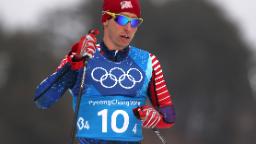
(CNN)It’s the fuel that drives performance – few things are as important to a top athlete as their diet.
Eating the right nutrients is critical to success, but so is an indulgent meal or two to keep spirits high during grueling workouts.
And at the end of the Winter Olympics, a new cookbook gives an insight into what top athletes do.
the Winning Recipes Cookbook is the brainchild of The Purple Project, an organization dedicated to helping survivors of domestic violence who have been working for the past year to create a gastronomic tome made up of the favorite recipes of some of America’s top Olympic athletes.
“The Purple Project came to me out of the blue,” former Olympic skier Noah Hoffman, who was invited to participate, told CNN Sport.
“At first I thought, ‘That’s a little weird, I’m not a chef. I don’t know if I can contribute to a cookbook.’
“But of course I love to cook. I think everyone loves to eat and I love to eat and I have favorite recipes.
“I actually sat down with my partner and we came up with the recipe together and made it once or twice to make sure we got it right.”
Hoffman’s offering of “Berry Dutch Baby” can be found in the breakfast section, but even he admits it’s aimed at those with a sweet tooth.
The recipe, which involves fried frozen berries beneath a baked batter, was a Hoffman favorite throughout his career, but only on rare occasions.
“Of course only on days off,” he said, laughing. “It’s a bit time consuming and maybe not the best training fuel, but a nice treat on a recovery day.”
READ: Canadian-born Humphries wins the gold medal for USA after filing a harassment complaint
8,000 calories a day
Hoffman retired from skiing after the PyeongChang Games in 2018 but has had a long career that has spanned two Winter Olympics.
Specializing in endurance racing, he would push his body “to the limit” during training to reap the rewards on race day.
Hoffman says he would “endlessly” consume food during training blocks.
He even remembers sitting down to eat over a pound of pasta for lunch.
“There was a time in my early 20s when I was still growing that I was consuming at least 8,000 calories a day. It’s an incredible amount of food,” he said, before recalling some of the tricks he’d used to increase calorie intake.
“So you cook a whole pack of pasta and eat it all in one sitting for lunch. It’s amazing.
“I wouldn’t advise that on any young athlete, but I couldn’t get my fill of it. I just kept eating. It was wild.”
Hoffman’s eating habits changed slightly as he became more successful, and he worked with a nutritionist for much of his career.
The US ski team employed nutritionists to help its athletes reach their optimal level of fitness, and Hoffman still watches what he eats even after retiring from skiing.
READ: Eileen Gu Reveals Her Mom Helped Her Turn Around Freeski Slopestyle Finals
“Athletes really want to give something back”
He says the nutritional requirements for competitors have changed over the years, as has the role of athletes in general.
Like many since the pandemic, Hoffman wants to use his platform as an athlete to change society for the better.
He admits he didn’t know much about the prevalence of domestic violence before working on this initiative, but says he was “humiliated” to learn more about the Purple Project’s work.
According to the organization, nearly 20 people are physically abused by an intimate partner in the US every minute, so the Purple Project seeks to provide help and support to domestic violence shelters.
“I think the role of an athlete has changed and I think that’s kind of part of a societal shift where politics seems a little more central and unfortunately a little more divided overall.
“So I think athletes like everyone have a need to speak up and are really passionate and want to make the world a better place.
“So athletes really want to give back and understand that they have a lot of influence and a lot of power to help organizations that they want to help.
“So I felt really honored to be a part of this project … and to learn about the Purple Project and all the work they do.”
Add Comment